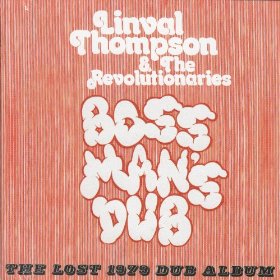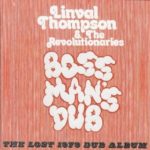
Linval Thompson & The Revolutionaries Boss Man’s Dub (Hot Milk)
10 Ft. Ganja Plant Skycatcher (Roir)
Plywood up the big windows, secure all the breakables, batten down the hatches … and then crank up the volume, boys and girls. What we have here are two very cool new reggae releases: one an old-school lost treasure; the other an example of some of today’s best players keeping that vintage roots vibe alive. (Scratch that: they’re not only keeping the roots vibe alive – they’re encouraging it to thrive and prosper.)
Kudos to the good folks at Hot Milk Records for firing up the riddim time machine to take us back to 1979, plunked down within the walls of Kingston, Jamaica’s legendary Channel One studio. Singer-turned-producer Linval Thompson was one of the many talents working out of Channel One during that period – making use of the crazy-good talents of the studio’s house band The Revolutionaries, led by drummer Sly Dunbar. The set of tunes on Boss Man’s Dub only saw the light of day briefly back in ‘79, circulated in limited numbers as a white-labeled pre-release. Whether that is a statement about the volume of work coming out of Kingston at the time or simply an unfair twist of fate matters not at this point; Boss Man’s 11 cuts (10 true dubs and one instrumental) still make for crucial listening today.
Of course, the mixing engineer is as important a set of hands in any dub production as the musicians themselves (the mixer basically plays the band). In the case of Boss Man’s Dub, however, the credit goes unclaimed: the engineer’s name (or engineers’ names, as the case could certainly be) have disappeared over the years like the wisps of sweet smoke that can be felt in the grooves of this album.
Thompson himself was the featured vocalist on half of the dub tunes here; the remainder are reworkings of roots classics by Freddy McKay, Michael Black, Anthony Johnson, and Sammy Dread. The same lack of documentation that leaves us wondering who worked the faders prevents us from knowing for sure who was playing on any given cut. It really doesn’t matter, however – apart from the credit deserved by all those involved. There are no stand-alone performances or tracks on Boss Man’s Dub. The album is best experienced as a 38-minute-long time capsule, rich with bass rumblewomp (most likely courtesy of Robbie Shakespeare or Lloyd Parks) and Sly Dunbar’s playful-but-always-nuts-on drum work. As the dubs shapeshift in your head, there are delights galore: horn lines by the likes of Tommy McCook and Vin Gordon appear from nowhere, wind themselves around the beat, and then vaporize; guitars (Ranchy Mclean or Dougie Bryan, perhaps?) and keys (could be Ansel Collins – but just as well might be Tarzan Nelson, Robert Lyn, or Ossie Hebert) bump, grind, swirl, and spiral.
Best of all, the modern remastering done by Nick Robbins provides excellent sound while retaining the vintage vibe. This is 1979 in a can, boys and girls – all you need to do is open it up and let it wash over you.
Meanwhile, back here in 2013, we are blessed with 10 Ft. Ganja Plant, who take their roots very, very seriously: hit play on any of their thirteen albums – including the brand-new Skycatcher – and you have classic spirit shaped by modern sonics.
One of many cool things about 10FGP is that their songs are never held hostage by the riddims; nor are the grooves ever weakened for the sake of melody. Another is the fact that the band has long avoided in-depth bios (or simple who-done-did-what album credits, for that matter) … but take a moment and think about The Revolutionaries, whom we talked about earlier. Similar to their roots heroes, 10 Ft. Ganja Plant is all about the tunes, not the egos. You like this stuff? Then play it again. Louder, if possible. It’s that simple.
“In The Garden” leads the way into the album – down a dubbed-out path featuring a bass line that’ll make your marrow jiggle. “It’s True” and “Where Do You Want To Be” are a couple of lazy-lidded bouquets – listen for that luscious little guitar break at the 2:13 mark of the former while a thread of blues-by-way-of-Trenchtown harp weaves through the latter. “Sounding Zone” manages to combine spaghetti-western-style guitar with deliciously gooey horn lines; the falsetto vocal of “State Of Man” slyly delivers a message with a punch as solid as the track’s underpinnings; “Hypocrites” takes a minor-flavored route to deliver its own wise warning.
You could lose yourself in the shifting depths of the title track (smiling all the way – there’s that harmonica again!) while “Collect The Trophy” is a neat mix of positive message and woop-swoop bass. Watch your friends’ heads spin around like a barn owl’s when “Sometimes We Play” drifts out of the speakers – for a moment, they might just think you’re laying some long-lost Wailer track on them. And “Sing And Dance” is a wonderful way to take things home – hell, you can even sing along, if you’d like.
10 Ft. Ganja Plant admits to hailing from the Northeast – and if you’re familiar at all with some of that corner of the world’s reggae scene, you might be able to put a finger on some of the all-stars who make up this ensemble.
But really and truly? Don’t waste time worrying about it. Let the music play.
*****
Brian Robbins hangs with the barn owls in the rafters over at www.brian-robbins.com.



No Comments comments associated with this post